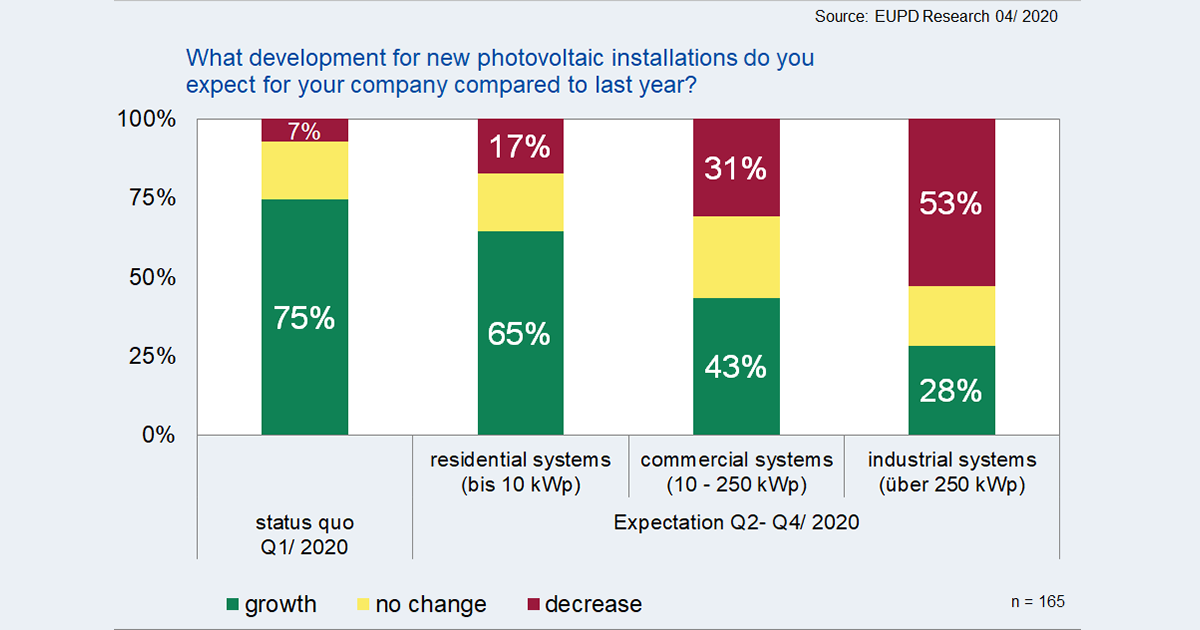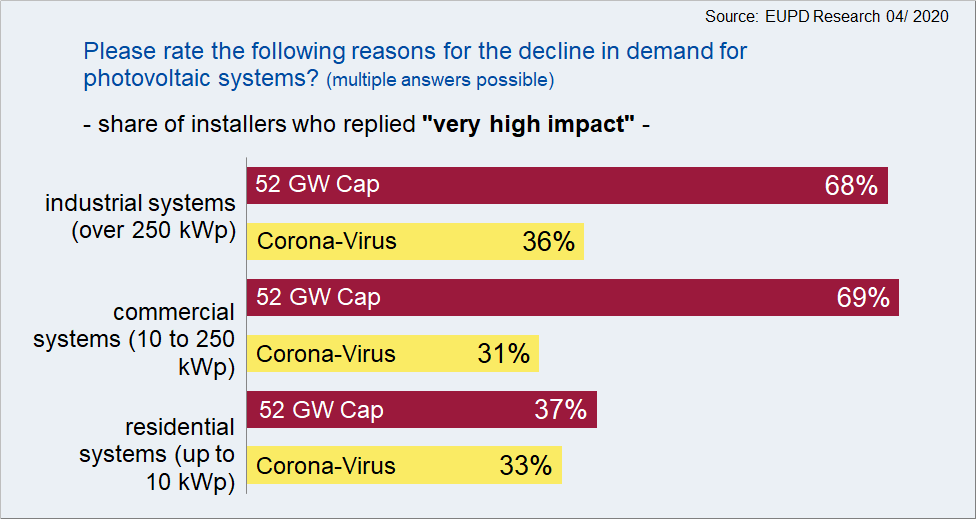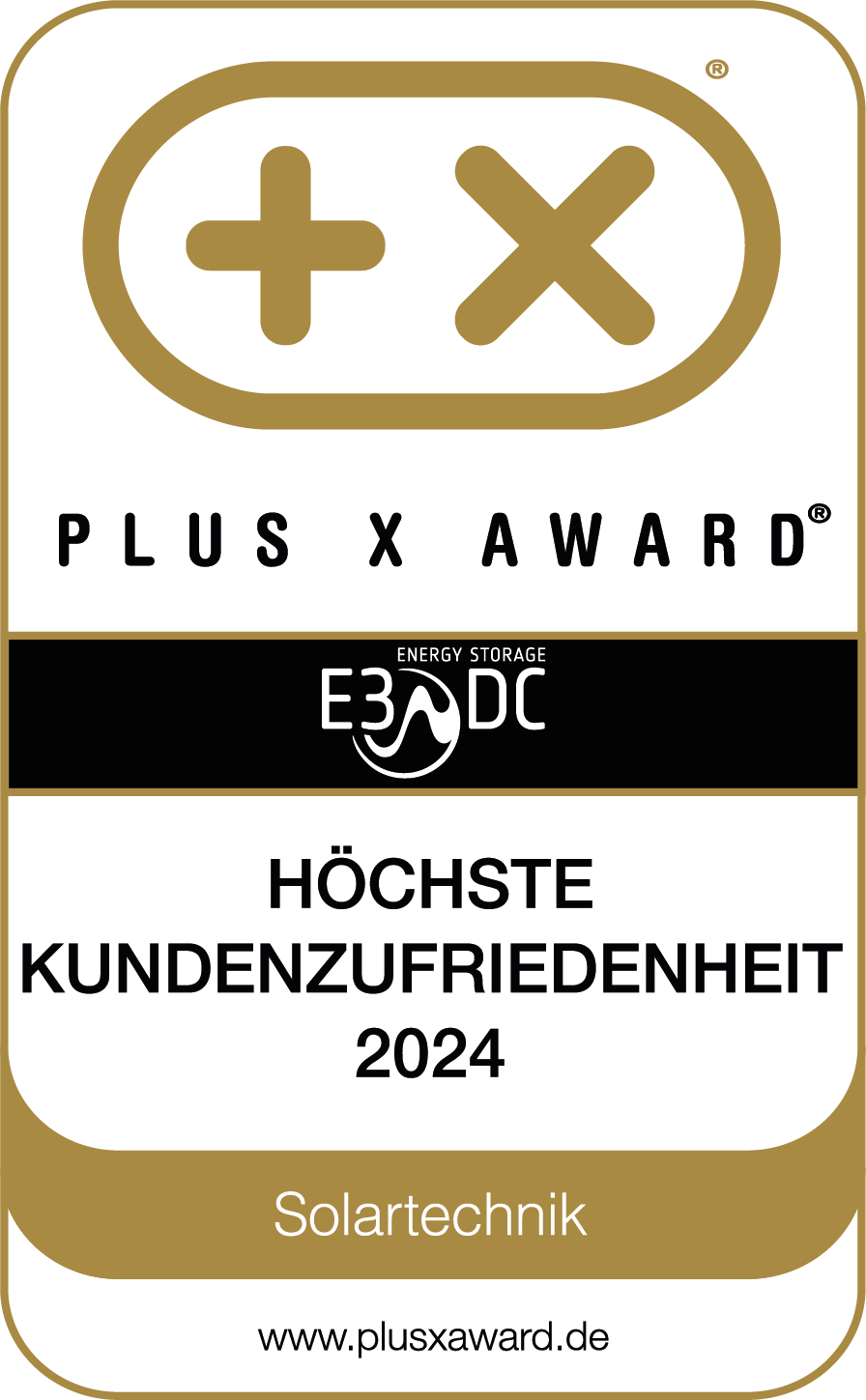
Sharp decline expected for the German solar market in 2020 – Policy failure assessed as more severe than the coronavirus pandemic
An ad-hoc EUPD Research survey among German solar installers reveals an expected market slump in 2020. The main reason is less a result of the current economic crisis caused by the coronavirus pandemic, but rather the faulty legislation that is unhinging the photovoltaics market in Germany. Taken the already dismantled wind industry into account, the collapse of the solar industry may mark the end of the energy transition.
Bonn. The German Energy Transition is celebrating an anniversary: with the introduction of the Erneuerbare-Energien-Gesetz/EEG (Renewable Energy Act, REA) a stable framework was established for the expansion of a climate-friendly energy generation. At the end of 2019, renewable energies made up 42% of Germany’s gross electricity consumption – which impressively demonstrates the success of the EEG. The year 2020, however, seems to be a fateful year for the German energy transition. And that is not only because of the global coronavirus epidemic.
While the positive solar market trend of the previous years continued in the first quarter of 2020 in Germany, a sharp decline is specifically anticipated for commercial and industrial solar power plants. A recent survey among solar installers, conducted by Bonn-based market and economic research company EUPD Research, shows a rather positive business climate between January and March 2020. A growth in sales is expected for small-sized solar systems up to 10 kWp for the remainder of the year. On the other hand, however, a sales drop is expected for commercial and industrial solar power plants (31% and 53% of the surveyed solar installation firms, respectively). This may strongly impact the development of the German solar market’s progress, because commercial plants (1.1 GW) and industrial solar plants (1.7 GW) accounted for more than 70% of all new solar installations in 2019.

While companies are suffering from the impact of the global coronavirus pandemic, the German solar sector is additionally facing challenges resulting from the legal framework conditions. The EEG was once the driving force and foundation for a sustainable market growth. However, the so-called “solar cap” limits new solar installations up to 52 GW, which is regulated in paragraph 49 (5) of the EEG, and is bringing this unique success story to an abrupt end. Although the coronavirus clearly leaves its mark on the solar sector, the solar cap has a significant impact as well.
In comparison to the effects resulting from the coronavirus pandemic, the impact of the 52 GW solar cap is considered more powerful (twice as much) for commercial and industrial solar plants, according to the current survey results from EUPD Research. For small-sized residential solar systems, however, the effect of the solar cap is considered only slightly stronger than that of the coronavirus.

“The political standstill regarding the removal of the solar cap is yet another step to end the German energy transition. Just like the coronavirus pandemic, climate protection must be addressed as a global challenge and must result in direct action”, comments Markus A. W. Hoehner, CEO of EUPD Research.
Alexander Schütt, Managing Director of the BayWa r.e. Solar Energy Systems GmbH, underlines: “The tactical game of the coalition has been going on for months, and it cannot continue to be carried out on the solar businesses. In September 2019, the abolishment of the solar cap had already been decided as a part of the climate and energy package. Such a decision is inevitable if the government wants to provide a long-term perspective to trade and solar installation companies, especially in times of the coronavirus crisis. Time is of the essence – thousands of livelihoods as well as the achievement of the goals for 2030 are dependent on that.”
“Grid operators buck the trend of savings based on the latest storage technologies, and therewith are spoiling the citizens’ future for Germany as an industrial location. CO2 reductions based on PV and storage solutions on site to operate heat pumps and electrical cars are being replaced by grid operators with coal-based electricity”, Dr. Andreas Piepenbrink, Managing Partner of E3/DC GmbH, added.
“Besides my responsibility for the company, I am making an urgent plea to the government in my role as board member of the BSW (Bundesverband Solarwirtschaft/ German Solar Association). The 52 GW solar cap, which will probably be reached in summer, must immediately be abolished. We need support and rapid actions by the government without further delays. It is an important decision concerning industry, medium-sized businesses and the society as a whole. The government must act now”, states Peter Thiele, President of SHARP Energy Solutions Europe.
Detlef Neuhaus, CEO of SOLARWATT, explains: “The PV cap stifles a domestic sector that is a growth engine for the German industry and provides income to more than 100,000 people. Despite corona our order books are full. Hence, we do not need political bailouts, but demand that the government honors the commitments made.”
The current EUPD Research market analysis is being supported by the leading representatives of the solar and battery storage sector: BayWa r.e., E3/DC, Sharp und SOLARWATT.
